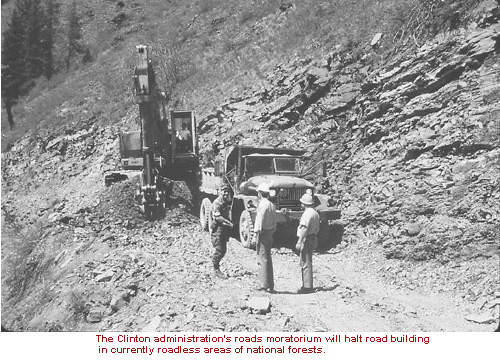A New Direction on Roads
Moratorium Will Stop Road Building in Many
National Forests
From the February Issue of The Forestry
Source
 USDA Forest Service Chief Mike Dombeck on January 22 announced that the agency
plans to implement a temporary moratorium on the construction of new roads in
roadless areas of national forests. The decision would freeze new road
construction in approximately 130 national forests pending the development of
a comprehensive roads management policy by the USDA Forest Service.
USDA Forest Service Chief Mike Dombeck on January 22 announced that the agency
plans to implement a temporary moratorium on the construction of new roads in
roadless areas of national forests. The decision would freeze new road
construction in approximately 130 national forests pending the development of
a comprehensive roads management policy by the USDA Forest Service.
"We cannot afford to manage our existing road system and are essentially proposing a time-out on road building in roadless areas until we can engage Congress and the American people in a constructive dialogue about where and when new roads should be built in national forests," said Dombeck. "We intend to develop a science-based forest transportation system that meets the needs of local people while minimizing and reversing environmental impacts such as erosion, landslides, and degradation of wildlife habitat and water quality."
During the moratorium, the Forest Service will convene a panel of scientists and draft new rules on road building. The proposed suspension of road building could last for 18 months, or until the new roads management plan is announced.The moratorium, which will be implemented after a public review period of 30 days, would apply mainly to roadless areas of at least 5,000 acres. It would effectively prevent timber harvesting on some of the nation's most inaccessible forestland.
The administration has been caught in a contentious debate over road building on national forests for years. The roads, many of which are built by forest products companies that harvest the timber, are often blamed for fragmenting important wildlife habitat and causing landslides, erosion, and other damage to streams. The forest products industry counters that road building undergoes thorough environmental review and that roads are necessary not only for timber harvesting, but also for firefighting and forest health management efforts, and are used by recreationists.
As the moratorium was being considered, members of the environmental community lobbied for a more stringent policy that banned road construction in roadless areas larger than 1,000 acres. The forest products industry argued that the proposal being considered altered forest management plans without allowing for full public input.
The Society of American Foresters has also been involved in the debate. When word got out that the administration was considering the new policy, SAF executive vice-president Bill Banzhaf wrote a letter to several major daily newspapers calling for a less heavy-handed approach.
"One-size-fits-all solutions to managing complex and diverse ecosystems are not appropriate," wrote Banzhaf in an op-ed letter published in several major daily newspapers. "If a roadless area should be set aside, we should determine this on a case-by-case basis through a comprehensive planning process with meaningful public input. These decisions should be made through a transparent process where interested citizens can be engaged. A policy that bans entry into all roadless areas would be an insult to the millions of landowners (i.e., the American people) who work to determine how the national forests should be managed."
Several western Republicans, including Representative Don Young (Alaska) and Senators Larry Craig (Idaho), Slade Gorton (Washington), Frank Murkowski (Alaska), and Gordon Smith (Oregon), warned the administration against a temporary moratorium on building roads in national forests. They said such a measure would meet with strong resistance in the GOP-led Congress.
In an apparent nod to the Republican lawmakers, the moratorium exempts roadless areas in Alaska's Tongass National Forest and those in the Pacific Northwest covered under the President's Northwest Forest Plan. According to the Forest Service, those lands are governed by recently developed management plans that employ the latest science and therefore don't need a new roads policy.
The moratorium would apply to about 33 million acres. Of those 33 million acres, nine million are defined by the Forest Service as "suitable for timber harvest" and therefore were more likely to be roaded. In addition to suspending road building in roadless areas of 5,000 or more acres, the moratorium would apply to roadless areas of 1,000 acres that adjoin wilderness areas or wild and scenic river areas. The suspension would also apply to any national forest roadless area or low road-density area that's judged by regional foresters to have "special and unique ecological characteristics or social values."
The Forest Service estimates that approximately 100 to 275 mmbf of timber currently planned for the Fiscal Year 1998 timber program may be delayed by the suspension of road construction in roadless areas covered by the moratorium. Timber sale contracts that have already been awarded and will be conducted in areas otherwise covered by the moratorium will not be subject to the suspension.